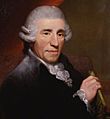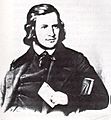Das Lied der Deutschen facts for kids
Das Lied der Deutschen ("The Song of the German People"), also known as Deutschlandlied ("The Song of Germany"), is a famous song. The music was written by Joseph Haydn and the words by Hoffmann von Fallersleben. Today, only a part of this song is the national anthem of Germany.
A line from this song, "Einigkeit und Recht und Freiheit" ("Unity and justice and freedom"), is also the motto of Germany.
History of the Song
How the Music and Words Came Together
The music for "Das Lied der Deutschen" was first written by Joseph Haydn in 1797. It was originally the anthem for Austria, called "Gott erhalte Franz den Kaiser" ("God protect our Emperor Franz").
Later, in 1841, the poet August Heinrich Hoffmann von Fallersleben wrote the words we know today. He wrote them while he was on the island of Heligoland. At that time, Germany was not one big country. Instead, it was many small states. Fallersleben wanted these German-speaking states to become one united nation.
Understanding "Germany Above All"
The first line of the song, "Deutschland, Deutschland über alles" ("Germany, Germany above all"), can sound very strong today. Some people misunderstand it. But when Fallersleben wrote it, he meant that creating a united Germany was the most important goal. He wanted all the different German states to come together.
The Song Through the Years
In the second half of the 1800s, Fallersleben's song became very popular in Germany. It wasn't the national anthem yet, but it was a song for people who dreamed of a strong and united Germany.
After World War I ended in 1918, the song became Germany's national anthem in 1921. During the time of Adolf Hitler, only the first part of the song was used. It was often sung along with a song from the Nazi Party. This part of the song was difficult for some people because it described Germany as including lands that were actually in other countries.
After World War II
After World War II, Germany was divided into two countries: West Germany and East Germany.
In West Germany, people tried to find a new national anthem. But in the end, the third part of Fallersleben's song was chosen to be the national anthem.
In East Germany, they used a different song with words by Johannes R. Becher. However, from the 1970s, the words were often not sung. This was because of the line "Germany, [our] unified fatherland," which didn't fit with Germany being divided.
When East and West Germany united again in 1990, Fallersleben's song once again became the national anthem of Germany. But today, only the third part of the song is used. The first part of the song is now mostly used by nationalist extremist groups.
German Words and Translation
German words of the song |
Close translation |
First stanza |
|
|
|
Second stanza |
|
|
|
Third stanza - the German National Anthem |
|
|
|
Related pages
- German National Anthem
Images for kids
-
Portrait of Haydn by Thomas Hardy, 1792
See also
 In Spanish: Deutschlandlied para niños
In Spanish: Deutschlandlied para niños




